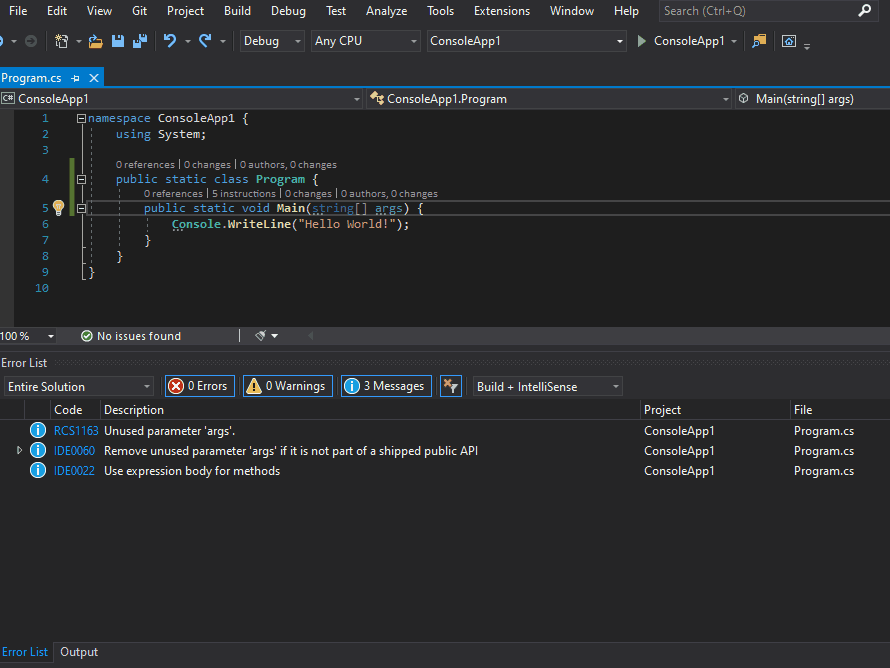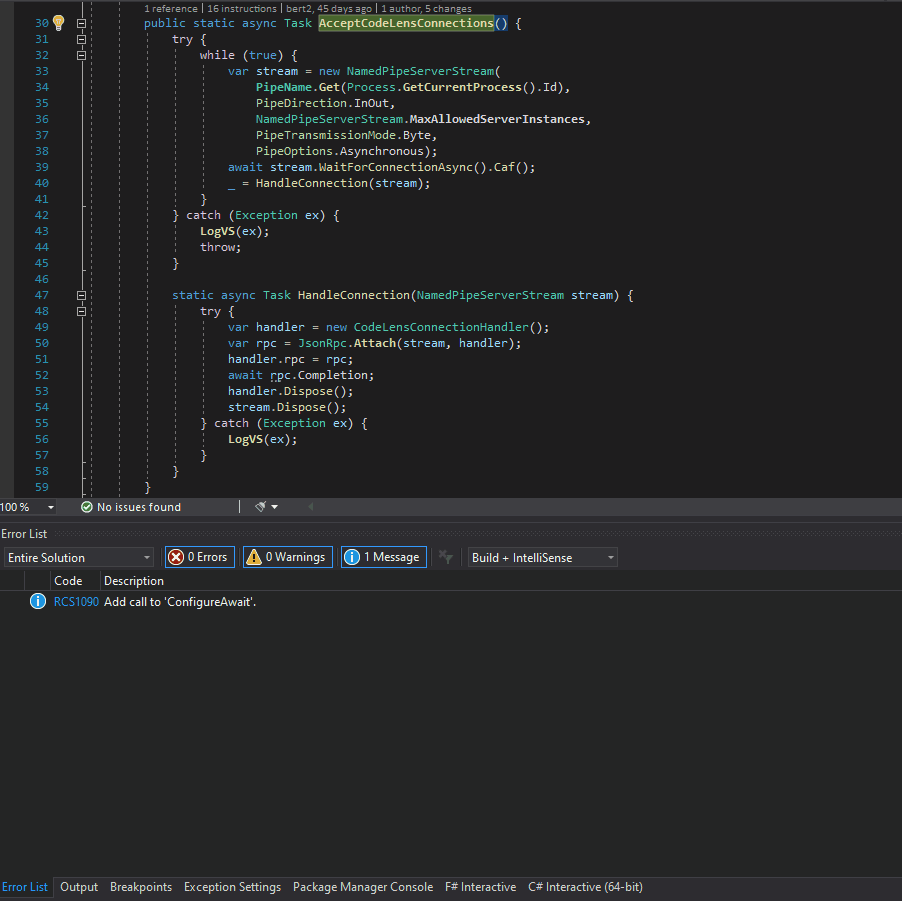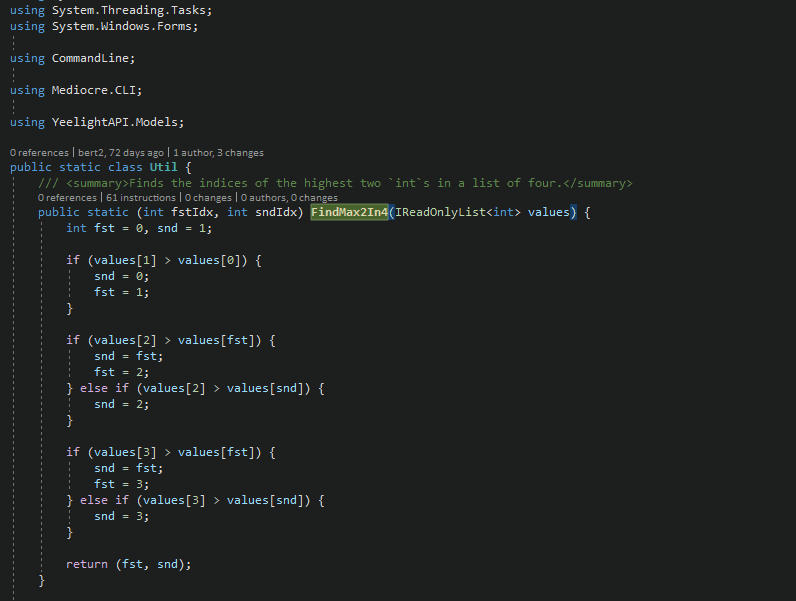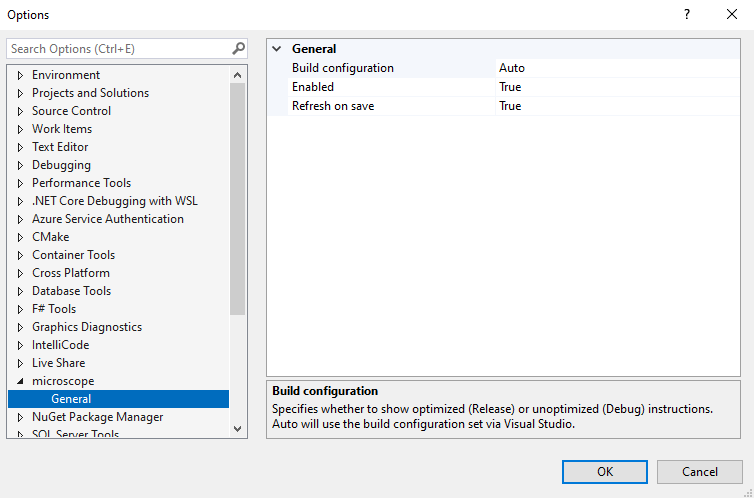microscope





A CodeLens extension for Visual Studio that lets you inspect the intermediate language instructions of methods and properties.

It also shows the compiler-generated code for lambdas/closures, local functions, async methods, and iterators:

It's mostly useful for learning and getting a better understanding of how C# works internally, but it's a must-have if you enjoy procrastinating work with futile micro-optimizations:

Installation
Visual Studio 2022
Visual Studio 2019
- Installation via Extension Marketplace is not possible. Download the VSIX package of the v1.1.0 release and install microscope manually.
Usage
- The CodeLens appears on C#/VB methods/properties and displays the number of instructions that will be generated for the method.
- Click the CodeLens to get a detailed list of all instructions including their offsets and operands.
- Hover over an instruction in the list to see its documentation summary in a tooltip.
- Double-click an instruction in the list to navigate to its documentation on docs.microsoft.com.
- Hover over the CodeLens to see individual counts for the number of
box and unconstrained callvirt instructions in the method as well the method's/property's byte size.
- The CodeLens will automatically update everytime you save the current document. You can also click the "Refresh" button in the bottom left of the details view.
- Any types that the compiler generated for the method/property (e.g. for lambdas) will be shown below the list of instructions together with their methods and instructions.
- In case the retrieval of instructions fails the CodeLens will display
- instead of a count. Hover over the CodeLens to see the exception that caused the failure.
- Configuration options are available in the Visual Studio settings ("Tools" > "Options..." > "microscope").

Known issues
- Visual Studio might freeze for a couple of seconds when you open the details view for a method with a huge amount of instructions (i.e. multiple thousands). This might be fixed in a future release.
Contributing
Bug reports and pull requests are always welcome!
Issue tracker
Feel free to create an issue on GitHub if you found a bug, have a question or got an idea how to improve microscope.
Cloning the source
PS> git clone https://github.com/bert2/microscope.git
PS> cd microscope
Building
Building microscope from source requires Visual Studio 2019 and the Visual Studio SDK.
You can build using either Visual Studio or the build script located in microscope's root directory:
PS> ./build.ps1 compile
Running the tests
The tests are implemented using MSTest. You can execute them via Visual Studio or from microscope's root directory:
PS> ./build.ps1 test # will also build
Microscope uses nuke as its build tool. You can install nuke's global tool via dotnet:
PS> dotnet tool install Nuke.GlobalTool --global
Don't forget to setup its auto-completion too.
Even though the global tool is not required, it makes life a little bit easier:
PS> nuke test # build and run tests
Possible features for future releases
- show C# code in details view
- lazy load when method has too many instructions to prevent temporarily freezing VS
- don't show CodeLens on interface/abstract methods
- reduce namespace noise in operands column of details view
- setting for that
- checkbox in details view for the setting as well
- is it possible to move in-memory compiling and IL retrieval out of the VS process?
- can we even access the
Compilation out-of-proc?
Changelog
2.4.0
- Support inspecting the instructions of properties.
2.3.0
- Support Visual Basic projects.
2.2.0
- The code lense tooltip now also shows the method's byte size.
2.1.0
- Adds new setting to the options page controling whether optimized (release) or unoptimized (debug) instructions are shown.
2.0.0
- Support Visual Studio 2022. Visual Studio 2019 is no longer supported.
1.1.0
- Adds support for local functions.
1.0.3
- Fixes
Mono.Cecil.AssemblyResolutionExceptions during retrieval of compiler-generated code.
1.0.2
- Fixes
NullReferenceExceptions during retrieval of compiler-generated code.
1.0.1
- Fixes a bug where the compiler-generated code for nested lambdas would not be shown.
- Fixes a bug where compiler-generated code for unrelated lambdas would be shown.
- Fixes a bug where the compiler-generated class for anonymous types would not be shown.
1.0.0
- Instructions of compiler-generated types/methods are now also shown below the instructions of the code-lensed method.
0.5.3
- Refactoring to greatly reduce the amount of data exchanged between the out-of-process CodeLens engine and Visual Studio.
0.5.2
- Fixes a bug where clicking on an instruction's opcode that has a trailing dot in its name would not open the correct documentation page.
0.5.1
- Fixes a bug where the documentation of instructions with opcodes that have a trailing dot in their name could not be retrieved.
- Adds a new custom UI for the details view, replacing the default grid UI. This is only a minor visual change, but enables future features like including instructions from compiler-generated classes or showing the CodeLens on classes.
0.5.0
- Add settings page to de/activate auto-refresh on save.
0.4.0
- Instructions are now refreshed automatically when saving a file.
- Don't duplicate compiler errors in the tooltip for failed CodeLenses.
0.3.0
- Show XML documentation of OpCode as tooltip when hovering an instruction.
0.2.0
- Double-clicking an instruction in the details view now opens its documentation in the browser.
0.1.3
- Fixes an issue where the "Refresh" button might not work when multiple instances of VS where open.
0.1.2
- Only fixes development problems with the pipe connections between VS and the CodeLenses by using a different pipe for the VS experimental instance.
0.1.1
- Fixes a bug where the "Refresh" button was not working properly when too many CodeLenses where loaded at once.
- Fixes a regression bug where instruction retrieval failures would not be shown in the CodeLens tooltip.
0.1.0
- Adds a "Refresh" button to the details view which retrieves the instructions of the method again.
0.0.5
- Fixes an issue where IL retrieval failed for projects with multiple target frameworks.
0.0.4
- Overload resolution has been extended to handle
dynamic parameters as well. There no longer should be any issues saying that a method couldn't be found or that a method couldn't be uniquely identified.
0.0.3
- Overload resolution has been extended to handle more types: arrays, pointers, and
refs.
0.0.2
- Overload resolution has been reworked completely and now works better with generic and/or nested types. Some issues might still remain and will be addressed in the next release.
0.0.1
Intitial preview release.
- Enables CodeLens on C# methods showing the number of IL instructions.
- Clicking the CodeLens opens a details view listing all IL instructions of the method.
- Refreshing the CodeLens after code changes currently requires closing and re-opening the C# source file.
Versioning scheme
Microscope's versioning scheme uses a manually maintained semantic version with an appended build number. A semver bump is triggered by creating a Git tag. The build version is auto-incremented by AppVeyor.
Credits
- VSCodeILViewer by Joseph Woodward only works with VSCode and isn't updated anymore. Joseph wrote a nice article on its implementation which helped me getting started.
- Msiler by Evgeniy Babaev looks like an excellent tool, but unfortunately it's not available for Visual Studio 2019. I discovered it when I was way into the development of microscope and if I had found it earlier, I might have tried patching Msiler first.
Dependencies
- Roslyn compiles the current project in memory.
- Mono.Cecil retrieves the IL instructions from the compiled project.
- nuke orchestrates the builds for microscope.









